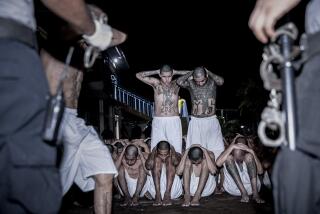Guatemala’s Record on Rights Called Worst in Latin America
- Share via
WASHINGTON — Although the level of violence and repression is less than it was a decade ago, Guatemala continues to suffer the worst record of human rights abuses in Latin America, the private Council on Hemispheric Affairs charged Saturday.
The council, in its 12th annual report on human rights in the Western Hemisphere, argued that Guatemala’s civilian President Vinicio Cerezo Arevalo serves as little more than a “feckless front man” for the military Establishment.
At the same time, it said that drug-ridden Colombia and war-torn El Salvador rank second and third on the register of human rights abuses.
Countries listed by the council in the next-worst category of human rights violations included Chile, Haiti, Mexico, Paraguay and Peru. Slightly better but still “unacceptable” were Brazil, Cuba, Grenada, Guyana, Honduras, Jamaica, Nicaragua, Panama, Suriname and Venezuela, the organization said.
The council’s much shorter list of nations with high standards for human rights included Costa Rica, Uruguay, the Dominican Republic, Argentina, Ecuador, Belize and most of the tiny English-speaking islands of the Caribbean.
When Cerezo took office in January, 1986, it was generally believed that an era of aggravated human rights abuses by Guatemala’s military regimes in the 1970s and early 1980s was ending. However, the council said, the country is still racked by wanton political murder, carried out both by the powerful armed forces and by leftist guerrilla groups.
The council said that the level of “repression now occurring under the constitutionally elected government . . . is far lower than during the period of military rule,” but it faulted Cerezo for failing to rein in the military or to curb violent death squads of both the right and left.
The council estimated that more than 600 Guatemalan political assassinations have been recorded this year. The actual figure is probably far higher, it added, because newspapers often fail to report political killings for fear of reprisal.
In the most recent incident, the bodies of 22 peasants bearing signs of torture were discovered Nov. 27 near the town of El Aquacate. Although responsibility has not been established, most signs point toward leftist insurgents as the killers.
However, the council said the incident only shows that “leftist forces can act with as little regard for human rights as those on the right.”
The council also said that the murder rate in Colombia is a remarkably high 52.8 per 100,000 population, and it placed blame on leftist guerrillas, right-wing death squads and the private armies of powerful cocaine traffickers.
In El Salvador, like Guatemala, the council said that it found some improvement over the last few years. But it said the changes were not enough to remove the country from the ranks of the hemisphere’s worst offenders.
“The single greatest factor affecting the human rights situation in the country is the . . . civil war, which has claimed an estimated 70,000 lives, most of them civilians,” the council asserted. “Although the country has not returned to the conditions of the early 1980s, when body counts reached 800 per month, there is grave concern for the sharp rise in civilian deaths from last year.”
For much of the rest of the hemisphere, the council said human rights abuses consisted mostly of infringement of political rights rather than indiscriminate killing. It reported some easing of the repression in the hemisphere’s two remaining military dictatorships, Chile and Paraguay, but said that conditions remain bleak in both countries.
The council criticized the leftist government of Nicaragua for alleged abuses by its court system, especially “the police courts, where due process is largely denied.” It said the courts, which can issue arbitrary sentences of up to six months in jail, have been used to punish political dissidents.
More to Read
Sign up for Essential California
The most important California stories and recommendations in your inbox every morning.
You may occasionally receive promotional content from the Los Angeles Times.













